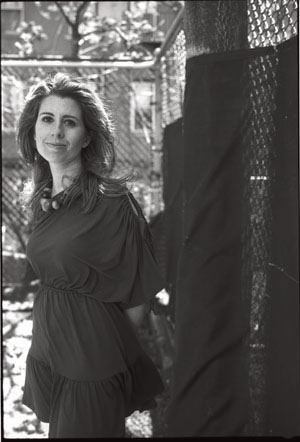In Mortgage Crisis, LAW Alum Helps Homeowners
Part two of “The Good Life: Six BU Alums at Work in the World”

Name: Carolina Trujillo
School: LAW’01
The difference: Families keep their homes
The world is shrinking, as everyone knows, and the tragedies and injustices in off-limits neighborhoods and distant countries are not nearly as easy to gloss over, morally, as they once were. The six Boston University alumni we’re profiling this week have chosen work that brings them into contact with the neediest people in our global society. Yet they do not consider themselves extraordinary. They are responding to an urge to engage that feels both necessary and obvious. As one says simply, “There isn’t a choice.”
Behind her friendly, casual manner, Carolina Trujillo is tenacious. As an undergraduate in her native Venezuela, she turned a job processing adoption paperwork at a government orphanage into a door-to-door crusade to raise money to improve the facility’s abject conditions. And now, on the front lines of the mortgage crisis, she’s working to save hundreds of Boston-area residents from losing their homes by cajoling lenders, hitting up real estate pals, and tapping her alma mater for help.
Trujillo (LAW’01) is director of home counseling at the Neighborhood of Affordable Housing (NOAH), a nonprofit community development organization that serves low- and moderate-income families in greater Boston. She was working part-time as a mortgage counselor for new homebuyers last year when calls began flooding in — many of them from Hispanic immigrants — about mortgage payments that had doubled and tripled as property values plummeted.
Trujillo, who specialized in banking and financial law at BU, did what comes naturally to her: she took action, creating a foreclosure prevention unit. “We had so many people coming in,” she recalls. “And NOAH didn’t have funds to hire anybody.”
She called her old connections at the School of Law’s Morin Center for Banking and Financial Law, and a handful of eager interns signed up. Then she cobbled together funding for part-time help and enlisted the volunteer services of local real estate agents and lawyers for weekly counseling clinics.
Trujillo logs 70-plus hours a week, showing desperate homeowners where to cut expenses, negotiating their cases with lenders, running home-buyer classes, and hitting networking events to forge alliances with other housing organizations. Quality time with her architect husband and two-year-old son is eked out in the mornings before work.
Many of Trujillo’s clients are recent arrivals to America, with poor English skills. As a Hispanic immigrant herself, she knows they come from countries where homeownership is the province of the elite. Many had managed to buy homes here with loans that required no money down or no income verification, opening the door to the dream. Some became victims of predatory lenders, she says, and some didn’t understand what they were signing; others fudged a few numbers, figuring they could clock more hours at work or supplement with savings and then refinance. But as the economy slumped, the extra shifts and their bank accounts shriveled, and when their interest rates reset, they had no way to absorb the blow.
“It’s really bad,” Trujillo says. “Since we started getting calls in September 2007, we’ve had more than 230 cases. Only 10 have been resolved so far.”
Trujillo’s weekly foreclosure clinics are held in a small conference room at NOAH’s offices in East Boston. Some homeowners bring their children, who roll under the tables or play with the large-buttoned calculators while their parents fill out monthly budgets and income worksheets. Before joining them, Trujillo hosts her weekly radio show from her office, dispensing real estate advice to the Spanish-speaking community. When she
appears, a slight woman with long brown hair falling over her shoulders, some don’t notice her until she clears her throat and firmly tells everyone they must fill out all the paperwork before they can see a counselor.
Samuel Chicas, a forklift operator from Fall River, Mass., is one of the lucky ones who went through the clinic. He had run out of options when his rate-adjusted mortgage payment ballooned to over $4,000 a month. Trujillo helped him secure a lower interest rate on two loans he had taken, and “I kept the house, thank God,” he says.
Trujillo says it’s all about perseverance. “You might call the lender and they’ll say, ‘We can’t do anything.’ Then you call again and someone else picks up the phone and they can do it.”
She says she tackles each case as if she were out to save her own home. She can’t quite put her finger on where the urge to help comes from and doesn’t spend much time trying. It’s just natural, she says. Suggest that it’s about helping the little guy, though, and she bristles.
“It bothers me that people think my customers are the little guy,” she says. “They’re people just like you and me — just guys, without the little.
Caleb Daniloff can be reached at cdanilof@bu.edu.
Check back tomorrow to read part three of “The Good Life: Six BU Alums at Work in the World.” Click here to read “Part one: SED Grads Bring Schools to South Asia.”
“The Good Life” was originally published in the summer 2008 edition of Bostonia.
Comments & Discussion
Boston University moderates comments to facilitate an informed, substantive, civil conversation. Abusive, profane, self-promotional, misleading, incoherent or off-topic comments will be rejected. Moderators are staffed during regular business hours (EST) and can only accept comments written in English. Statistics or facts must include a citation or a link to the citation.